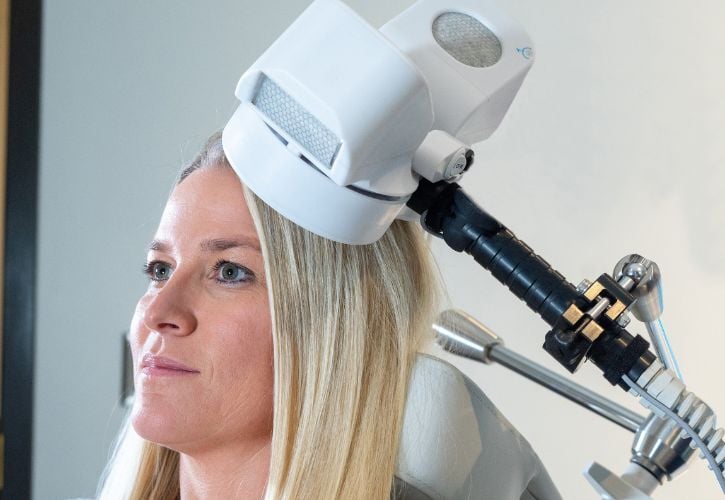Efficacy of TMS for Depression compared with other treatments
May 10, 2023 - neurocare group

For several years now, neuromodulation treatments such as TMS have emerged as a promising therapeutic options for people suffering from depression who do not respond to traditional therapies such as medication and psychotherapy. Here is a brief review of the most recent studies on the effectiveness of TMS as monotherapy and as combined therapy.
How effective is TMS compared to other treatments for depression?
Studies and meta-analyses have consistently shown that TMS is an effective treatment for depression. A review of different antidepressant treatments found that TMS had comparable response and remission rates to psychotherapy and medication, but with a unique focus on treatment-resistant depression (TRD)1. Furthermore, studies show that TMS is effective as monotherapy, with response and remission rates of up to 50%2.
One of the benefits of TMS is its targeted approach to depression. By using magnetic fields to stimulate specific regions of the brain, TMS can activate neural pathways that have been disrupted in depression. This targeted approach makes TMS an attractive treatment option for individuals who have not responded to other treatments.
Moreover, TMS is a relatively safe treatment option. With correct screening procedures there are no serious side effects, other than a mild focal headache. TMS also does not carry the risk of dependence or withdrawal symptoms associated with some antidepressant medications.
Combining TMS with Psychotherapy enhances depression therapy
A recent study conducted by Donse and colleagues (2018) compared the effectiveness of TMS monotherapy to TMS combined with psychotherapy. The study found that a combination of TMS and psychotherapy led to significant clinical improvements, including a 55% remission rate. This is in contrast to similar studies using TMS as monotherapy, which showed remission rates of 31-37%2. This suggests that combining TMS with psychotherapy may lead to even better treatment outcomes.
It is important to note that TMS is not a standalone treatment for depression. Rather, it is best used in conjunction with other treatments, such as psychotherapy. A combination of TMS and psychotherapy, sometimes referred to as "talk and pills," may be particularly effective for individuals with TRD who have not responded to other treatments.
In conclusion, TMS is a promising treatment option for depression, especially for individuals who have not responded to traditional treatments. Studies and meta-analyses have consistently shown that TMS is effective as monotherapy, with response and remission rates comparable to other treatments like medication and psychotherapy. Furthermore, combining TMS with psychotherapy may lead to even better treatment outcomes. While more research is needed to fully understand the effectiveness of TMS in treating depression, the current evidence suggests that it is a valuable treatment option for individuals with TRD.

Figure 1: Response and remission rates of various monotherapeutic and combinatory antidepressant treatments based on the largest studies and datasets available.3
TMS therapy is useful also in OCD treatment
Neurocare has contributed to many recent studies on the effecitiveness of TMS.
In some Neurocare clinics, patients with therapy-resistant Obsessive Compulsive Disorder may also be treated with TMS. We achieve good results, in the United States TMS for OCD has already been approved by the Food and Drug Administration (FDA). Neurocare is currently collaborating with several large mental health care institutions and hospitals in the Netherlands on the TETRO (TMS for Exposure Therapy-Resistant OCD) study, in which the effectiveness of TMS in therapy-resistant Obsessive Compulsive Disorder is being investigated. This study is currently ongoing in 5 cities in the Netherlands, namely: Amsterdam, Groningen, Eindhoven, Nijmegen and Maastricht.
Just as this has been the case with therapy-resistant depression since 2018, the hope is that this study will further endorse the effectiveness of TMS in OCD and this will lead to reimbursement of this treatment from health insurance companies.
If you want to know more about this research? Visit tetro-ocd.nl
Are you a mental health professional considering adding rTMS to your depression treatment offerings?
Our mission is to empower clinicians all over the world to adopt these leading and evidence-based practices of neuromodulation, using the right technologies, so that more people can access these treatments.
Clinicians interested in learning more and possibly applying techniques such as TMS, can start with an online course on neurocare's LMS (Learning Management System). After completing our convenient self-paced course, participants are then welcome to join us in one of our hands on workshops run neurocare academy throughout the world.
We also offer custom training packages for hospitals, research and practice settings, helping to train your team with confidence and offer any further end-to-end business solutions in neuromodulation.





